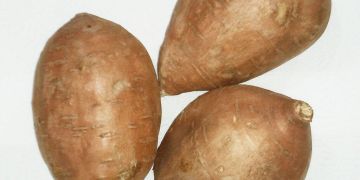Though sweet potatoes and yams are actually unrelated, the two are confused across the North American continent to the extent that lawmakers have allowed sweet potatoes to be packaged as yams, provided that the true name is also on the package. Sweet potatoes are not only delicious, but much better nutritionally compared to traditional potatoes. Antioxidants, fiber, vitamins, and low glycemic index make them a solid choice for healthy eating.
Sweet potatoes were first cultivated long ago across Central and South America. Currently they are grown all across the American continent, as well as New Zealand, Polynesia, Japan, Korea, and China. China has become the largest producer, with a huge percentage of crops going toward feeding livestock, but the sweet potato is used as a staple food across Africa and so production and consumption per person is much larger there. In the United States, the largest crop is grown in North Carolina.
Good Carbs
Though many people think of potatoes as a “bad carb,” sweet potatoes should not be classed with white carbohydrates. Their orange flesh is most commonly eaten, but the green plant above is also edible, though some find it bitter. These orange potatoes have none of the hallmarks of a bad carb, with excellent nutritional value, high fiber, and low glycemic index.
Low Glycemic Index
A glycemic index is the rate of absorption of the sugars produced after eating. Many diabetic consumers are familiar with sugar spikes and crashes, but everyone is affected by a quick burst of sugar and then the energy crash afterward. Sweet potatoes have been shown to promote more stable blood sugar levels.
Many studies have found that lower glycemic index foods, like sweet potatoes, leave people feeling fuller longer, and without cravings. This is one area where fruits and white carbohydrates tend to fail. Additionally, this makes sweet potatoes a great choice for diabetic consumers. Fiber plays a role in the low index score, with 3g per 100g of sweet potato. A diet high in natural fiber leads to better health in a variety of ways, with better digestion, heart health, and weight management.
Vitamin Content
In terms of vitamins, the sweet potato has a varied collection. Vitamin B6 energizes and has been linked to the prevention of heart disease. 100g of sweet potato contains 15% of the recommended daily allowance (RDA) of vitamin B6. Vitamin B5, which also regulates energy and sugar absorption, comes in at 16% of the RDA. Vitamin A is well known for its sight enhancing properties, but it also keeps skin looking fresh and young. In poverty stricken areas, childhood blindness due to vitamin A deficiency is common. Just 100g of sweet potato can provide 89% of the RDA. Of that, 79% is in the form of beta-carotene. The combination of beta-carotene and Vitamin C, which it also contains in trace amounts, is anti-inflammatory and can also help those with chronic asthma or arthritis.
Minerals
Minerals such as iron, potassium, phosphorus, and magnesium are also present in smaller amounts (5-7% of the RDA). Iron helps with white blood cell production and immune functionality. Potassium is found in many foods, and is essential to maintaining good blood pressure. Magnesium also contributes to good heart health, and regulates mood.
Antioxidants
Sweet potatoes are a good source of antioxidants. Studies have shown that they may increase resistance to the poisons people run into daily, such of mercury and carcinogens. The free radical prevention of sweet potatoes may have significant positive impact on cancer prevention. Beta-carotene and Vitamin C are essential for this protection, and sweet potatoes are a good source of both.
NOT really a potato!
To summarise, though they carry the name "potato," sweet potatoes should not be classed with white potatoes in terms of nutrition and health. This is especially true when one considers how the two are usually prepared. White potatoes are often cooked with large amounts of salt and butter, if not a full mashed preparation with cream and cheeses. By contrast, with its slow-digesting yet still delicious natural sugars, sweet potatoes are easily enjoyed plain or with only a small amount of butter. The natural brilliance of this vitamin powerhouse shines in a simple preparation, making it easy to cook and good to eat.





